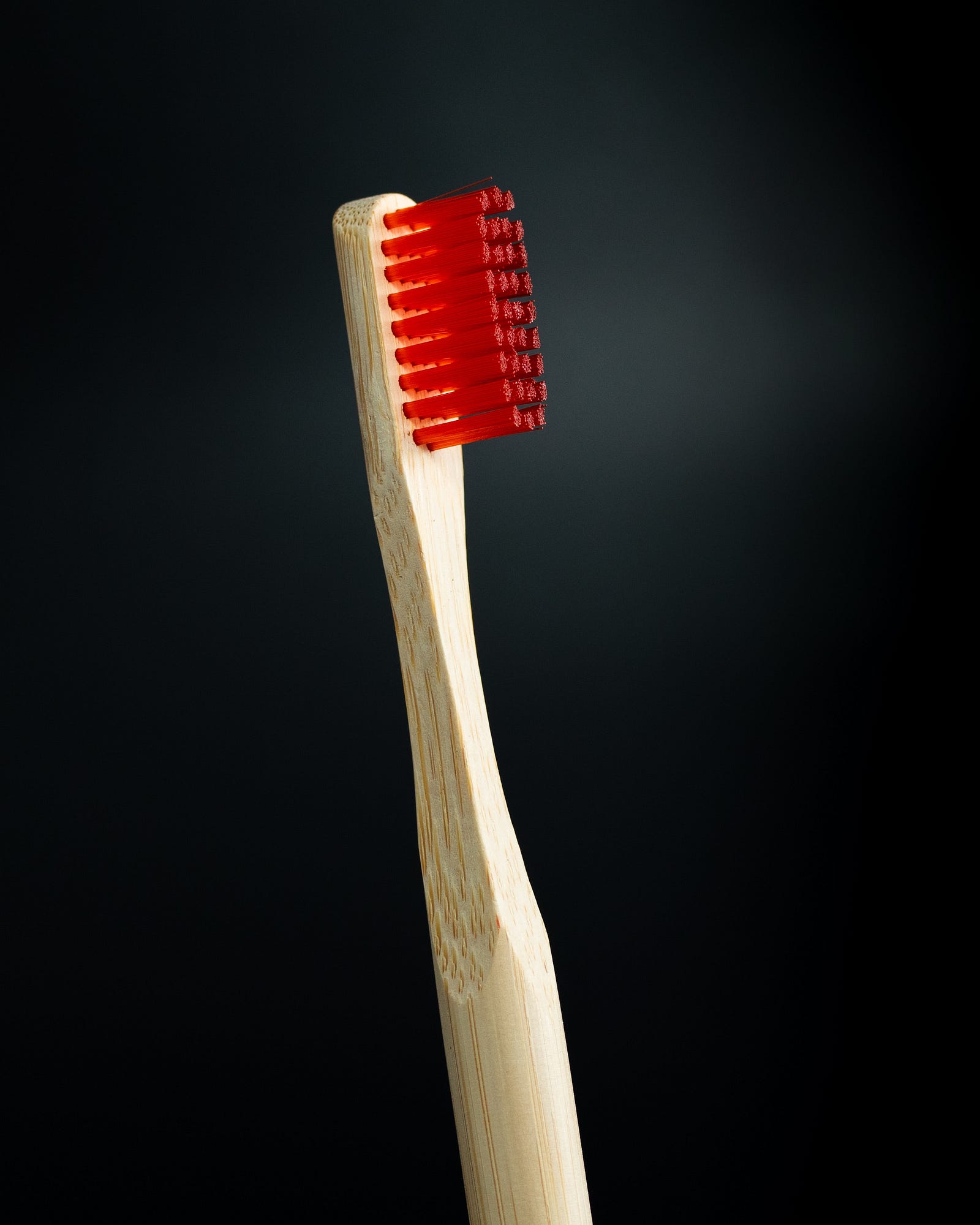The Lowdown on Tongue Scraping: Worth the Hype?
I AM FASTIDIOUS ABOUT HYGIENE, including dental. I brush several times daily. And yes, I floss. But what about tongue scraping? This essay gives you the lowdown on tongue scraping: Is it worth the hype? Is tongue scraping good?
When it comes to oral hygiene, brushing, and flossing are the usual suspects that come to mind.
However, there’s another player in the game that’s often overlooked but has been around for centuries: dental scraping. In this guide, we’ll delve into the pros and cons of dental scraping in simple terms anyone can understand.
It’s been around for at least a couple of thousand years. The Romans did it. The Victorians did it. Even U.S. first President George Washington, famous for his dental troubles, did it.
Oral hygiene has a rich history. The Ancient Egyptians cleaned their teeth by rubbing on a mixture containing ash of ox hooves, myrrh, powdered and burnt eggshells, and pumice.
Even much later in 18th-century Britain, toothpowders contained similarly abrasive ingredients such as bits of china, brick dust, and cuttlefish.
“Are There Any Benefits to Tongue Scraping?” That’s the headline I recently saw in the New York Times. I decided to explore the evidence for tongue-scaping.
What is Tongue Scraping?
While I don’t do tongue scraping, I regularly brush my tongue. My goal? I want to remove debris, bacteria, and dead cells from the tongue’s surface.
Tongue scraping is running a simple tool across your tongue to remove bacteria, food particles, and other debris from the surface.
Some people use tools, usually made of metal or plastic, to scrape along the tongue’s surface gently. Others are like me, preferring to use toothbrushes for this purpose.

Five Pros of Dental Scraping
There are several reasons why you should consider scraping your tongue. Here are my top five:
- Dental scraping freshens breath.* One of the most immediate benefits of tongue scraping is fresher breath. The tongue can accumulate a coating of bacteria and debris, contributing to bad breath. Scraping after each meal helps remove these odor-causing culprits, leaving you with minty-fresh breath. A tongue scraper is more effective than brushing your tongue, according to one very small study looking at volatile sulfur compounds.
- Improved Taste Perception. A clean tongue enhances your ability to taste food. When your tongue is coated with bacteria and dead cells, it can dull your taste buds. Scraping helps clear this layer, making your meals more enjoyable.
- Enhanced Oral Hygiene. By removing bacteria from the tongue, you reduce the risk of these bacteria spreading to your teeth and gums. This maneuver can help prevent issues like cavities and gum disease.
- Better Overall Health. Some studies suggest maintaining good oral hygiene, including tongue scraping, may benefit systemic health. Research indicates a potential link between oral health and conditions like heart disease, diabetes, cancer, and respiratory diseases.
- Easy to Do. Dental scraping is a simple practice that can be easily incorporated into your daily oral hygiene routine. It takes a minute or two and requires minimal effort.
* Not all studies have shown tongue scraping reduces foul breath.
A small 2017 study of 18 patients with periodontitis — a serious form of gum disease — discovered tongue scraping made no difference in the amount of bacteria or odor in their mouths (even as patients said they felt their tongues were cleaner).
Five Cons of Dental Scraping
- Gag Reflex. For some individuals, tongue scraping can trigger a gag reflex, making the process uncomfortable or difficult. If you have a sensitive gag reflex, you may need to be extra gentle and patient when scraping your tongue.
- Potential for Injury. If not done correctly, tongue scraping can cause minor injuries, such as cuts or irritation. A dedicated tongue scraper or a soft toothbrush and applying gentle pressure are essential to avoid damage.
- Not a Standalone Solution. While tongue scraping can be beneficial, it’s not a replacement for brushing and flossing. Combining scraping with regular brushing and flossing is essential to maintain good oral health.
- Taste Alterations. Some people report changes in taste perception immediately after scraping. This change is usually temporary and results from disturbing the taste buds temporarily. Still, one study found that tongue scraping lowered the coating on the tongue after two weeks, leading to a better sense of taste. A tongue scraper might help you distinguish between sour, bitter, sweet, and salty sensations better.
- Frequency Matters. It would be best if you scraped regularly to reap the benefits of tongue scraping. Skipping this practice may lead to a resurgence of the issues you were trying to prevent.
Don’t Forget…
You can help maintain (and even improve) your overall oral health if you:
- Use fluoride-based mouthwash and toothpaste to help fight cavities.
- Brush your gums and teeth at least twice daily.
- Brush for a minimum of two minutes.
- Floss at least once daily to remove tough-to-reach debris between your teeth.
- Drink lots of water throughout the day to avoid dry mouth, a common cause of bad breath.
- Avoid tobacco, as it can contribute to buildup on the tongue.
My Take — Is Tongue Scraping Good?
In the world of oral hygiene, dental scraping has its share of pros and cons. On the positive side, it can help freshen your breath, enhance your taste perception, and contribute to better oral health.
Dental scraping is a simple practice that requires little time or effort.
However, it’s not without its drawbacks. For some, the gag reflex can be an issue, and there’s a potential for minor injuries if not done correctly.

It’s also important to remember that tongue scraping is not a standalone solution but should complement your regular brushing and flossing routine. And please don’t forget those dental care visits.
Ultimately, the decision to incorporate tongue scraping into your oral hygiene routine is personal. If you’re considering it, it’s best to consult your dentist, who can provide guidance based on your needs and preferences.
My Misconception of Tongue Scraping
You know what tongue-scaping can and cannot do. Here are two misconceptions I had before writing this essay.
First, tongue scraping would offer extended benefits when reducing bad breath. While getting rid of odor-causing bacteria reduces bad breath, consistency matters.
Scrape in the morning, and you may develop bad breath later in the day. With oral consumption of food and drink, bacteria can accumulate. Scraping after each meal reduces the odor problem. Consistency matters.
Second, I thought using a toothbrush on your tongue was as effective as a tongue scraper. Unfortunately, a toothbrush does not remove as much bacteria.
By balancing the pros and cons, you can make an informed choice that supports your oral health and leaves you with a fresher, cleaner mouth.
Interested in trying tongue scraping? Healthline offers some guidance:
Tongue Scraping: 5 Benefits, Side Effects, Using a Spoon, and More
www.healthline.com
The information I provided in this blog is for educational purposes only and does not substitute for professional medical advice.
Please consult a medical professional or healthcare provider for medical advice, diagnoses, or treatment. I am not liable for risks or issues associated with using or acting upon the information in this blog.
Thank you for reading “Is Tongue Scraping Good?”




